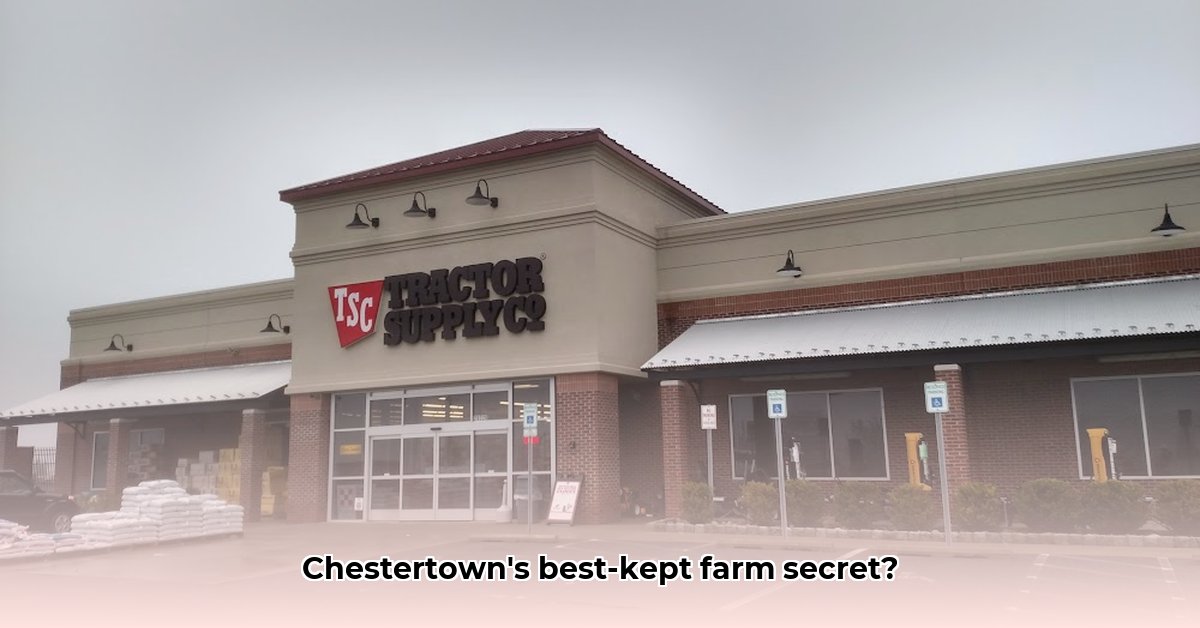
Tractor Supply in Chestertown, Maryland, serves as a vital resource for local farmers and gardeners, providing essential supplies and, increasingly, a platform for sustainable agricultural practices. Its central location and established history make it a cornerstone of the community, but its potential for broader environmental impact remains a key area for development. This article explores its current role, identifies opportunities for improvement, and offers actionable steps to enhance its contribution to sustainable agriculture in Chestertown. For more information, visit the Tractor Supply Chestertown website.
Tractor Supply Chestertown: A Community Hub
Tractor Supply's convenience is undeniable. Its strategic placement offers easy access to crucial supplies for both urgent needs and routine stocking. This accessibility is a significant asset, especially during peak planting and harvesting seasons, minimizing disruptions to crucial agricultural operations. The store's long-standing presence further emphasizes its importance as a reliable partner for generations of local farmers.
Beyond the Transaction: Expertise and Personal Service
Beyond simply selling goods, Tractor Supply's staff contribute valuable expertise. Their knowledge, gained through years of experience working with local farmers and gardeners, provides a level of personalized advice rarely found in larger retail settings. While buying online is convenient, the human interaction and tailored support offered by Tractor Supply create a crucial community connection. This personalized service encourages repeat business and builds trust, solidifying the store's status as a vital community resource. But how can this expertise be leveraged to promote broader sustainable practices?
Sustainability: A Growing Opportunity for Tractor Supply Chestertown
While Tractor Supply currently caters to the needs of local farmers, its contribution to sustainable agriculture is an area ripe for expansion. The availability of organic seeds, water-conserving irrigation systems, and environmentally friendly tools would significantly benefit the Chestertown area's sustainability efforts. However, the success of this expansion depends on several factors, including farmers' awareness of these options and their willingness to adopt sustainable practices. This highlights a need for proactive engagement and educational initiatives. Does Tractor Supply have the capacity and will to fill this crucial gap?
Charting a Greener Future: Actionable Steps for Growth
To significantly advance its sustainability profile, Tractor Supply can focus on three key areas:
Expand Sustainable Product Lines: A wider selection of organic seeds, water-efficient irrigation technologies, and eco-friendly tools would directly support sustainable farming practices. This expansion could increase sales, attract environmentally conscious customers, and enhance the store's brand reputation. However, this requires an initial investment and may face challenges tied to slower initial sales.
Foster Community Partnerships: Collaboration with local environmental groups on educational workshops and sustainability initiatives would strengthen community engagement and build a stronger profile in environmental stewardship. While this requires time and resources, the resulting increased customer loyalty would be a significant payoff.
Embrace Data-Driven Decision Making: Tracking sales data for sustainable products allows for better inventory management and informed decisions about future offerings. This data-driven approach necessitates investment in data analytics but offers a powerful way to optimize inventory and respond directly to customer demand.
A Shared Responsibility: Working Towards a Sustainable Future
The responsibility for promoting sustainable agriculture in Chestertown is shared. Tractor Supply's proactive efforts must be complemented by local farmers and gardeners actively seeking and demanding sustainable products. Open communication—perhaps through community forums or workshops—can foster collaboration and drive positive change. Dr. Emily Carter, Professor of Chemical and Biomolecular Engineering at Princeton University, emphasizes the importance of collaborative efforts in achieving ambitious sustainability goals, stating, "Real progress in sustainable agriculture requires a multi-stakeholder approach where retailers, farmers, and researchers work together." This collaborative spirit is crucial for the long-term success of sustainable agriculture in Chestertown.
Navigating Sustainable Choices at Tractor Supply Chestertown
Finding sustainable options at Tractor Supply requires careful planning and in-store navigation. This section provides a practical guide to maximizing your sustainable shopping experience:
A Step-by-Step Guide for Sustainable Shopping
- Plan Ahead: Identify your specific needs and research available sustainable alternatives.
- Scrutinize Labels: Look for certifications (like USDA Organic) and keywords like "organic," "natural," and "biodegradable."
- Compare Products: Don’t solely rely on price; compare ingredients and sustainability credentials across different brands.
- Engage Staff: Utilize store employee expertise to locate relevant products and understand their features.
- Explore Alternatives: If a perfect match isn't available, consider alternatives that minimize environmental impact.
- Supplement Locally: Combine Tractor Supply purchases with supplies from local nurseries or cooperatives to round out your sustainable options.
The Future of Tractor Supply Chestertown: A Vital Community Partner
Tractor Supply occupies a unique position in Chestertown, serving not just as a retailer but as a vital link in sustaining local agriculture. By investing in sustainability initiatives, fostering strong community relationships, and meeting the evolving needs of its customers, Tractor Supply can secure its future while contributing significantly to a greener farming future in Chestertown. The store's long-term success hinges on its ability to adapt and respond to the growing demand for sustainable agricultural practices.